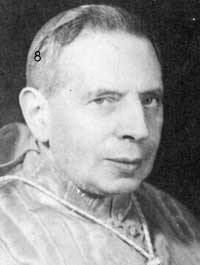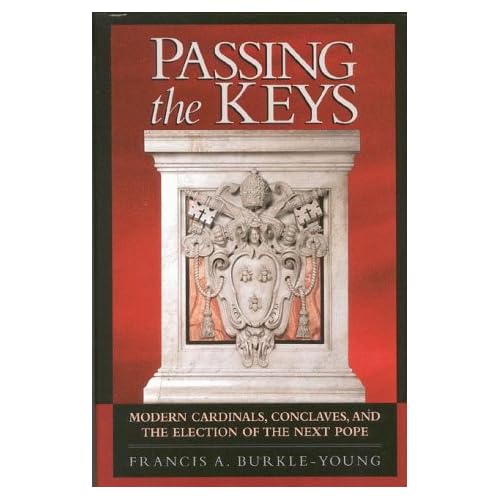FROM THE CONCLAVE OF 1963 TO
THE CONCLAVE OF 2013:
"CONTINUITY AND REFORM"
THE ERA OF THE "FIVE POPES"
COMES TO AN END
(Part Four of five)
Five popes at one Council -- the Second Vatican Council -- and now will come a new Pope, not a Churchman dur-ing the Conciliar years.
For more than fifty years -- more accurately, since the Conclave of 1958 -- the five Cardinals who have been elected Pope have all been "men of the Council":
1958: Angelo Cardinal Roncalli, in the Conclave of October 25-28, (11 ballots) became Pope John XXIII -- who surprisingly convened Vatican II.
1963: Giovanni Battista Cardinal Montini, in the Conclave of June 19-21 (6 ballots) became Pope Paul VI -- who guided the Council through the final three of its four sessions.
1978: Albino Cardinal Luciani in the Conclave of August 25-26 (4 ballots) became Pope John Paul I. He had attended the Council as Bishop of Vottorio Veneto. His papacy would last only one month.
1978: Karol Cardinal Wojtyla in the Conclave of October 14-16 (8 ballots) became the first non-Italian Pope in over four centuries. The Archbishop of Krakow, who had attended all the Council's sessions, took the name John Paul II.
2005: Josef Cardinal Ratzinger in the Conclave of April 18-19 (4 ballots) became Pope Benedict XVI. He had been a peritus at Vatican II - an expert theologian who accompanied Cardinal Frings of Cologne.
Now comes the Conclave of 2013 -- and the era of fifty years of Popes who were present at one Council will come to an end .
Most probably, the Cardinal who will be elected in the next week (beginning March 12) will have been born after 1940. He will therefore have been ordained a priest after 1965 -- after the close of the the Council.
Who will he be?
Fifty-nine (or just a little more than one-half) of the Cardinals in Conclave were born in 1940 or later. They are:
Italians (12)
Bagnasco, Bertello, Betori, Calcagno, Comastri, Filoni, Piacenza, Ravasi, Scola, Sepe, Vallini, Versaldi
Germans (2)
Marx, Woelki
Spanish (1)
Canizares Llovera
French (all 4)
Barbarin, Ricard, Tauran, Vingt-Trois
Polish (2)
Nycz, Rylko
Other Europeans (7)
Bozanic (Croatia), Duka (Prague), Eijk (Utrecht), Erdo (Budapest), Kock (Switzerland), Puljic (Bosnia), Schonborn (Vienna)
Brazil (2)
Braz de Aviz, Scherer
Mexico (2)
Rivera Carrera, Robles Ortega
Argentina (1)
Sandri
Other Latin Americans (4)
Cipriani Thorne (Peru), Rodriguez Maradiaga (Honduras), Salazar Gomez (Colombia), Urose Savino (Venezuela)
United States (6)
Burke, DiNardo, Dolan, Harvey, O'Malley, Wuerl
Canada (2)
Collins, Ouellet
Nigeria (1)
Onaiyekan
Other Africans (6)
Napier (S Africa), Njue (Kenya), Pengo (Tanzania), Sarah (Guinea), Turkson (Ghana), Zubeir Wako (Sudan)
India (3)
Alencherry, Gracias, Thottunkal
Other Asians (3)
Ranjith, Rai, Tagle
Oceania (1)
Pell (Sydney)
The name of the next Pope -- if he is 70 years old or younger -- is in the list above.
Considered in terms of the continents (Europeans 28 ... Latin Americans 9 ... North Americans 8 ...Africans 7 ... Asians and Oceania 7)
it may appear that he will probably be European.
Considered from another angle, however, the Europeans do not dominate (Europeans 28 ... the rest of the world 31).
Wherever he is from, whoever he is -- from the above list or from those even a bit older -- he will know the Council "second-hand". He will not have been there -- not present in the aula of St. Peter's Basilica during the years from 1962 to 1965.
The new Pope will have learned about the Council as history -- from studying Roncalli, Montini, Luciani, Wojtyla and Ratzinger.
His election will, in a way, be the end of a certain linear continuity ... but it may afford the new Pope an opportunity for dynamic reform.



 (Cardinal Lercaro and
(Cardinal Lercaro and



